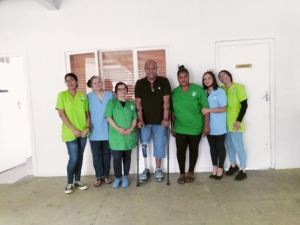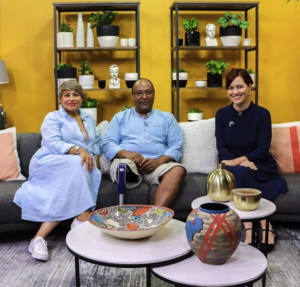Upon meeting Salih Hendricks, it is easy to see why he is such a well-known name in the diabetes community in South Africa. His cheerful demeanor, empathetic nature and lived experience have made him an outstanding advocate for other patients with diabetes and amputations. As a person living with diabetes for most of his life, Hendricks is very familiar with the complications and setbacks a diabetes diagnosis can present. However, instead of letting his struggles defeat him he decided to use them to educate and empower people in his home country of South Africa and beyond. By sharing his story at conferences and with the media as well as providing digital and in-person outreach, he informs people who may not know how to live with diabetes.

Salih Hendricks as a boy
Hendricks understands firsthand the challenges that come with type-1 diabetes and the devastating impact it can have on a person’s life. Since his diagnosis of diabetes at age 12, he has endured many hardships, including the loss of friends and family members to the disease, the loss of his leg, and the degeneration of his eyesight. Despite all of this, Hendricks’ lived experience has been a driving force behind his advocacy work.
Peer Support and Outreach
His interest in outreach started in the 90’s when he began educating diabetic patients in clinics, speaking to those who were unaware of how to maintain healthy lifestyles in regard to their diagnosis.
South Africa is a melting pot, with many differing cultures and language barriers surrounding medical care. Hendricks knows that many people do not understand medical jargon or complex explanations of how to manage their diabetes. He is able to help these underserved populations by through a cultural approach to teaching and using simple concepts that can be understood by everyone, such as suggesting that a person eats four smaller meals a day rather than one large meal. But also to not let the diabetes consume them.
“I try to motivate them to not think about diabetes all of the time. To get it under control the best you can and love life. Everything in moderation,” said Hendricks.
Providing Free Screenings
Making physical screenings for diabetes available to the public is another facet to the outreach work Hendricks and his team have been involved in. One of the main screening initiatives takes place during annual Diabetes Awareness Day. In partnership with local clinics and hospitals, they provide free diabetes screenings to the public. The aim of these clinics is to raise awareness about the importance of early detection and management of diabetes.
In addition to the Diabetes Awareness Day, Hendricks and his team have also been involved in regular diabetes screenings in community centers, schools, and workplaces. At the events, attendees are given a variety of screenings, including blood glucose tests, eye and foot ulcer screenings, and other diagnostic tests to determine their risk of developing diabetes or any related complications. These screenings provide convenient access to diabetes testing for people who may not have access to healthcare facilities or cannot afford the cost of testing.
According to Hendricks, a multidisciplinary approach was needed, as complications from diabetes encompass several medical specialties. Luckily, many members of the medical community are supportive of the initiative.
“To manage diabetic amputees we approached doctors, physios, endocrinologists, and podiatrists on a low-cost support basis, but a lot of them are doing it for free, because there are people in our communities who cannot afford healthcare,” Hendricks said.

Salih Hendricks and Clinic Staff
Creating Public Awareness
Hendricks is a regular speaker at diabetes conferences and events, such as the annual #dedoc° Diabetes Online Community Symposia, where he shares his personal story and raises awareness about diabetes and amputations. Hendricks has appeared on numerous television shows, including SABC’s Morning Live and Expresso Morning Show, where he has discussed the challenges of managing diabetes and the importance of education and peer support.
Knowledge is one of the most important tools in the struggle against diabetes, not only for those living with it, but also for those in risk of getting it as well as people close to them. Creating public awareness is therefore key in preventing complications and saving limbs and lives.

Salih Hendricks and other presenters at SABC’s Morning Live and Expresso Morning Show
Advice for patients: “Love your life”
When asked what advice he had for patients who struggle to find support and resources, Hendricks repeated one phrase more than the rest: “love your life.” He also said, regarding the diabetic amputee community specifically, to “not be embarrassed about anything that you overcome or the condition that leads from diabetes.”
Hendricks had this final word to say to patients who may struggle with their diagnosis:
“Living with diabetes is not easy. You have your ups and your downs, but with a positive approach and acceptance to everything that has come your way, you can live a beautiful life.”
By living this way himself, Hendricks is indeed making the world a better place for not only his surrounding South African diabetic and amputee communities, but also the world at large.
Learn more about Salih Hendricks’ work by watching these videos in which he is featured:
Follow Salih Hendricks on Social Media: